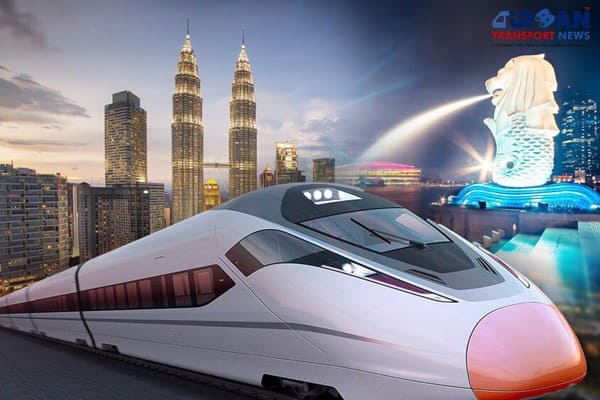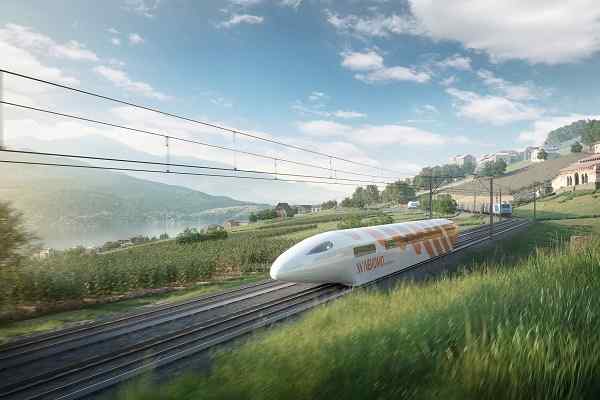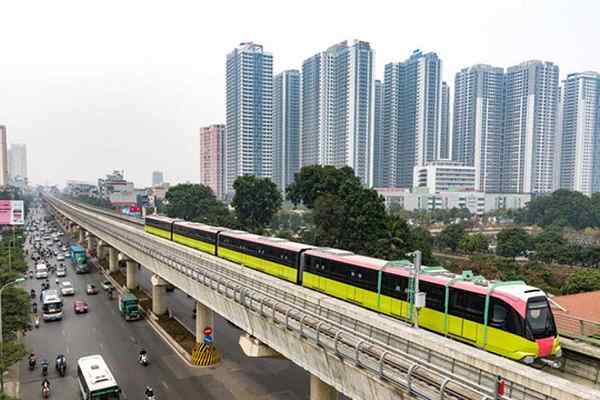 Vensa Infrastructure wins ₹412.58 crore civil contract for Hisar Airport
Vensa Infrastructure wins ₹412.58 crore civil contract for Hisar Airport Kuala Lumpur-Singapore high-speed rail project cost could be slashed to RM70 Billion
Kuala Lumpur-Singapore high-speed rail project cost could be slashed to RM70 Billion Nevomo's MagRail Technology Selected for Hyperloop Freight Demonstrator
Nevomo's MagRail Technology Selected for Hyperloop Freight Demonstrator Russia signs deal to procure bullet trains for Moscow - St. Petersburg high-speed line
Russia signs deal to procure bullet trains for Moscow - St. Petersburg high-speed line Vietnam plans new metro rail lines to replace its BRT systems in Hanoi
Vietnam plans new metro rail lines to replace its BRT systems in Hanoi  Revolutionizing Indian Railways: The Rise of Indigenous High Speed Bullet Trains
Revolutionizing Indian Railways: The Rise of Indigenous High Speed Bullet Trains Ayodhya deployed Gobbler Litter Buster to keep the City clean
Ayodhya deployed Gobbler Litter Buster to keep the City clean BMW's Emissions Investigation: What Does It Mean for Drivers?
BMW's Emissions Investigation: What Does It Mean for Drivers? 171 Years of Indian Railways: A History of Innovation and Progress
171 Years of Indian Railways: A History of Innovation and Progress Vande Bharat Express trains carries over two crore passengers since their inception
Vande Bharat Express trains carries over two crore passengers since their inception
The push to Electric Buses is need of hour

Electric vehicles have received enough traction in recent years. Just a couple of years back, names like "Nexon" and "Tesla" were well-known among the general population. Electric bikes, trains, scooters, trucks, and also electric planes are also being developed. With regards to intra-city transport, however, the bus remains the most accessible alternative for a big section of the metropolitan population. With ample electric bus manufacturers getting ready to go into production, this could become a common occurrence much sooner than most people think.
A Highly Sustainable Solution
City leaders are scrutinizing the effect of public transportation, especially emissions from typical diesel buses, as environmental concerns grow in relevance. Bus exhaust again is a big health problem for residents in densely populated places. One way to mitigate this negative environmental impact is to employ electric buses. The electric buses market provides a number of advantages over diesel-powered buses, including zero carbon emissions. They are also quieter, simpler to maintain, and cost less to run. Electric buses, like personal electric vehicles, take electricity from the grid to charge. Some portions of the system, however, are more sophisticated than others, relying more heavily on renewable energy sources. According to a recent study, electric buses emit less carbon compared to diesel buses in every part of the country.
Invisible Pollution Can Take a Toll
On our streets these days, seeing fuel exhaust and soot streaming from a bus tailpipe is unusual. However, it still occurs. Modern diesel-hybrid engines, for example, can still emit the tiniest particles that pass through diesel particulate filters. Ultrafine particles, which can also contain heavy metals, can readily penetrate the lungs and enter the bloodstream, triggering inflammation and weakening the immune system, according to new research. Other 'clean' diesel technologies, such as those used in modern diesel-hybrid vehicles to minimize carbon monoxide (CO), nitrogen oxides (NOX), and hydrocarbons (HC), are also being investigated. Even the most advanced diesel-hybrid buses fail to function as well as advertised in real-world settings, according to recent studies. Furthermore, the conventional catalytic converter in a diesel-hybrid vehicle employs urea (NH3) as an end-product, which produces nitrous oxide (N2O). N2O is a greenhouse gas (GHG) that has a warming potential of 300 times that of CO2. Furthermore, many harmful gases and carcinogens, like polycyclic aromatic hydrocarbons and most volatile organic compounds, are not eliminated by pollution controls in diesel-hybrid technology (VOCs). NOX and VOCs are highly reactive in the atmosphere, even in low quantities, and cause the creation of ground-level ozone, a recognized hazardous pollutant. Finally, none of the present pollution reduction methods used in contemporary combustion engine vehicles provides direct CO2 mitigation. That is why, when comparing a combustion bus to an electric bus, it is clear that electric buses are a healthier option.
Step to Clean Energy Transition
For those who spend a significant amount of time living and working in close proximity to concentrated bus emissions — commuters, bus drivers, and bus service employees working in garages and maintenance facilities – battery-electric buses indeed represent a substantial air quality improvement. Because it is often low-income and blue-collar employees who rely on the bus to get to work, school, and medical appointments, the bus system’s electrification have a major environmental justice component. Electric buses along with being efficient & cost-effective may also be used as a public health tool in areas where clean air is most needed.
Switch to Electric School Buses for Improved Academic Performance and Health
Electric school buses definitely are a tool for environmental justice for children in many polluted areas around the country. Each year, replacing a single diesel bus with that an electric bus can save 54,000 pounds of greenhouse gas emissions. Schoolchildren, whose developing bodies are more vulnerable to the effects of pollution, breathe air that is more than five times worse inside a diesel bus than outside the bus. That explains why studies suggest that taking diesel school buses lowers a student's test performance. By replacing a diesel bus with an electric bus, air pollution is reduced, and children's health and academic performance are improved. That should be sufficient to compel change.
Electric buses are quieter than diesel buses, generating significantly less noise and vibrations, making for a higher comfortable ride. In short, now is the time that electric buses to become mainstream.







